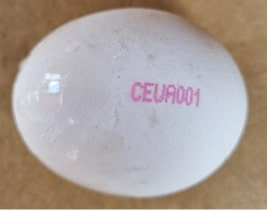For those who enjoy eggs, here’s some news that is far from eggcellent.
Eggs from a farm in Ukraine are being recalled.
Why?
The Singapore Food Agency (SFA) detected Salmonella enteritidis (SE) in them.
What a shell-shocking situation.
Singapore Food Agency Recalls Eggs
SFA issued a media release on 8 August announcing the news.
The eggs were imported from LCC “Yasensvit” farm in Ukraine.
If you want to know if your eggs are affected, look out for a “CEUA001” stamp on your eggs.
Affected eggs can be identified by the stamp “CEUA001”, as seen in the picture below:

Ingesting food with SE may cause one to fall sick if the food is eaten raw or undercooked.
Thus, the SFA has instructed importers to withhold or recall the affected eggs, just in case.
As for the farm, it’s facing consequences as well.
LCC “Yasensvit” farm in Ukraine is now suspended and will not be allowed to export its eggs to Singapore until further notice.
According to the SFA, it will only lift the suspension when the farm has rectified the SE issue.
Are Your Eggs Safe?
Thankfully, heat can destroy SE, making eggs safe to eat if cooked thoroughly.
However, if you’re a fan of runny yolks, listen up.
SE can survive in raw and undercooked eggs.
Consuming such eggs may cause illness.
Some symptoms include diarrhoea, abdominal pain, fever, nausea and vomiting.
While symptoms usually go away within a week, SE can potentially cause more severe infections in the vulnerable.
Vulnerable individuals include the elderly, young children and those with weakened immune systems.
If you have purchased affected eggs, the SFA advises you to cook them thoroughly before eating them.
In the event that you feel unwell after consuming an affected egg, seek medical attention immediately.
Singapore’s Egg Exporters
Food security is a priority as Singapore is a small island with no natural resources.
Singapore has worked hard to increase the number of egg exporters.
The country began importing eggs from Ukraine in June 2019.
As of October 2019, 4.6 million eggs were imported from Ukraine into Singapore.
More recently, Brunei and Indonesia were approved as egg exporters in December 2022 and April 2023, respectively.
Currently, Singapore has a total of 18 accredited egg exporters.
Around two-thirds of our eggs are imported.
While most come from Malaysia, Singapore also imports eggs from Thailand, Australia, Poland, New Zealand, and Spain.
The remaining one-third of eggs are produced locally.
In April 2023, Minister of Sustainability and the Environment Grace Fu encouraged Singaporeans to be open-minded to new food sources.
The SFA also reminded Singaporeans of potential supply fluctuations and the need for Singapore to strengthen its food resilience.
Basically, Singapore doesn’t want to put all its eggs in one basket.
Staying Safe When Eating Eggs
Eggs imported into Singapore must come from accredited sources that meet the SFA’s food safety and animal health standards.
For instance, farms need to be free from SE.
As the past few years have shown, the SFA doesn’t play around.
In October 2022, eggs from a Malaysian farm were recalled after SE was found.
Local egg farms must have good farm management practices and strong biosecurity measures to reduce the risks of SE contamination.
All eggs are subject to SFA’s inspection and testing, whether they are local or imported.
Here’s a way to find out if your eggs have gone rotten.
Just fill a bowl of cold water and place the eggs in it.
If the eggs sink to the bottom of the bowl and lay flat, you’re safe.
If the eggs sink to the bottom of the bowl but stand, you’re still safe, but the eggs aren’t as fresh.
If the eggs float, it’s time to bade them farewell.
